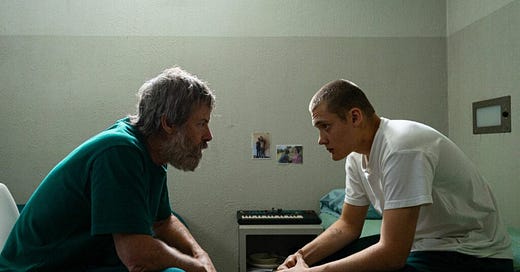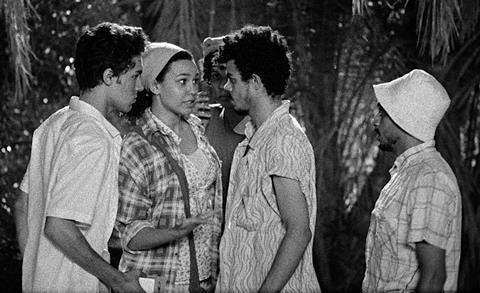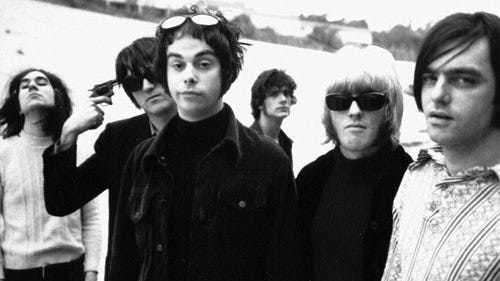MIFF is well under way and some of KinoTopia’s finest old and new critics bring fresh capsule reviews of films that are not to be missed in the second week of the festival!
Twilight Time
John Hughes, 2024
15+
Words by Digby Houghton
For many radicals of a certain vintage the dismissal of Gough Whitlam by the governor-general John Kerr in 1975 proved to be the death knell of Australian politics, culture and society. For some directors the historical moment lurks in all their films. For director John Hughes, whose 1985 docu-fiction film Traps explores the Hawke administration and underlying conspiracy theories, this much is true. For in his latest film Twilight Time the attention is cast onto defence strategist extraordinaire and polymath Desmond Ball.
Ball’s political defiance began in 1966 when he protested the Vietnam war. The war’s legacy permeated for many of the Left in the 1960s. When Robert Menzies and subsequent governments began leasing land to American intelligence it became a point of alarm for people like Ball. Predominantly focussing on Pine Gap – an intelligence base located near Alice Springs – Hughes’ comprehensive account provides a teleology of the base. The film recounts the shifting perceptions of the base (from a necessary evil to purely evil) to the backdrop of Ball’s illustrious life. Perhaps Hughes should have limited the scope and chosen from one of the ideologies that has underpinned US-Australian intelligence throughout Ball’s life.
Inside
Charles Williams, 2024
MA15+
Incarceration is a structure invented with the notion that punishment can reform even the worst of people - if you so believe in such a thing. But, as debutant writer-director Charles Williams asks, what if there is no redemption? Mel (Vincent Miller) is sentenced to prison after the brutal killing of a boy from school. This leaves him wandering from juvenile detention to prison where he ends up sharing a room with Warren (Guy Pearce) who has a grizzly forlorn beard and deep-set eyes and chugs alcohol from expired milk cartons, eats twisties and chews Fun Fables (since Fantales went out of business). He is an absent father who is later granted an exemption to visit his son Adrian (Toby Wallace) who lives off the inheritance of his mother – getting high and drinking – stirring signs of sanctimony in the hypocritical Warren.
Mel is a talented pianist who piques the interest of the garish priest Mark Shepherd (Cosmo Jarvis) – convicted for abusing children at a young age. Jarvis’ performance is replete with unrestrained tics and facial jerks rendering the monster of Mark as close to real as possible. Soon after Mal arrives Warren arranges with an inmate for Mal to kill Mark and for the money to be split between them. The film unravels much the same as the oft-cited proverb attributed to Scottish poet Robert Burns, “the best laid plans of mice and men oft go astray.” Inside revels in the inherent anarchy of humans by demonstrating guilt and reprehension are mere constructions. In Williams’ world every human is deeply evil. At one stage, before Mal is preparing to kill Vincent, Warren says to him “even the most wrong people have a little bit of good in them.” And it’s precisely this lack thereof that divides all the characters.
East of Noon
Hala Elkoussy, 2024
18+
Words by Linus Tolliday
Director Hala Elkoussy’s second feature, the black-and-white 16mm-shot East of Noon, is as much fairy-tale as invective against the power structure that dominates a small, industrial Egyptian town. Our hero, Abdo (Omar Rozek), is a young musician fighting the oppressive local power structure. At almost all times, the film, like Abdo, simmers; and when it doesn’t, it explodes. The local entertainer, Shawky (Ahmed Kamal), has it out for Abdo and holds strong influence over the town, while the corrupt and violent magistrate, Borai (Osama Aboul Atta), personally targets Abdo’s friend, Nunna (Fayza Shama). The film drifts between these heightened, archetypal characters and bursts of realistic violence and emotion, a sharp division which serves to punctuate the moments of cruelty and pain. The film follows Abdo’s growing resistance, which Elkoussy adorns with formal experimentation, such as high-intensity moments giving way to colour sequences, and a repetition of water imagery to symbolise the emotional states of the characters. Elkoussy and cinematographer Abdelsalam Moussa also employ a medium-specific motif of what is typically an unintentional effect of uneven film exposure, by masterfully shaping light leaks into ripples across the screen to invoke the aquatic theme. A tale of resistance and self-expression, East of Noon holds on a note of anger and frustration, though always with a clear love for storytelling.
The Shrouds
David Cronenberg, 2024
18+
Words by Jacob Agius
David Cronenberg has built his oeuvre around a fetishistically macabre focus on the human body, its incessant adaptability and the ways in which burgeoning technologies play a part in its degeneration. However, in his latest film The Shrouds, the body in question is dead and in its place lies something more cerebral – grief.
The film plays out as a rumination on our collective experience with grief in the digital age and its ramifications on our psyche. We follow tech businessman, Karsh (Vincent Cassel) who in the wake of his wife’s death has invented a burial shroud fitted with microscopic cameras that allows mourners to livestream their decaying loved one’s remains. Throughout the film he obsessively watches his late wife’s skeleton at seemingly every waking moment on any smart device he can get his hands on. These devices also house an AI assistant which takes the form of a digital avatar resembling his late wife. Through his embrace of technology Karsh is constantly haunted by her image, stuck in a techno-necromance that consumes his entire life.
Through Karsh’s obsessive actions it’s clear that Cronenberg posits the overindulgence of sharing every moment of our life (here, even in death), our unending interest in smart technology and social media has extended the grieving process far beyond necessary, in this case, through an unnatural ability to indefinitely hold onto those that we’ve lost. Cautioning that when our grief becomes wedded to our smart devices our perception of reality is degenerated, as we’re lost in an endless scroll we lose our livelihoods in the reflection of the black mirror.
Dig! XX
Ondi Timoner
Unclassified 18+
Words by Jasper Caverly
Dig! is the confessional of Dandy Warhols frontperson, Courtney Taylor-Taylor (sic), and his homoerotic fixation on the Brian Jonestown Massacre's frontman/cult-leader: Anton Newcombe. It is a grotesque display of unchecked ego and delusion - equal parts fascinating as it is vile.
Newcombe is the star of this rock-doc, a sociopathic prophet and guitar-music’s biggest loser. It’s glaringly obvious that Taylor-Taylor wants to fuck him, as if he were the second-cumming of Christ. He is the Dean Moriarty of this on the road tale: a disturbed genius hellbent on destruction (or a revolution as he declares).
“They’re a great band and I love their music but they’re not very well adjusted people,” says Taylor-Taylor, right as the audience is starting to forget the documentary is about the Dandy Warhols too.
So what exactly do audiences get with the additional 40 minutes in Dig! XX? Well, context mostly. And that’s kind of it.
Director Ondi Timoner promises more updates in the upcoming theatrical cut and even more content to follow in the physical media release. It’s agonisingly clear that Dig! XX is cashing in on its abiding super-fans, much like Apocalypse Now: Redux and Blade Runner *insert definitive cut here*.
I have to mention that MIFF have missed by not screening the film at the Forum, where the Brian Jonestown Massacre played their final gig to date in November, 2023. Anton Newcombe returned to Berlin where he - despite his onstage meltdown that brought the Australian tour to an abrupt end - has apparently become a statesman-like family-man.
It's hard to believe the same guy who wrote 'Thank God For Mental Illness' (for a total of $17.36) relaxing in Kreuzberg. Good luck and godspeed, Mr. Newcombe.
WEEKLY FILM LISTINGS
17 August - 21 August
Get to a MIFF venue and support local cinema!








